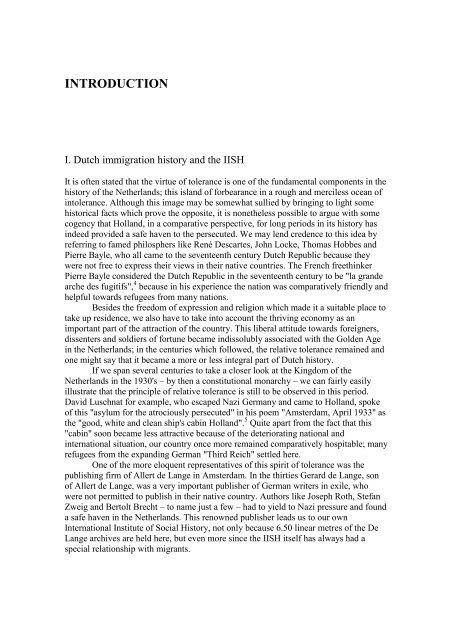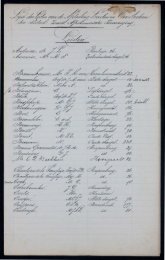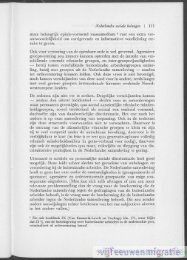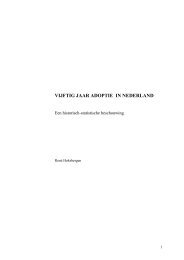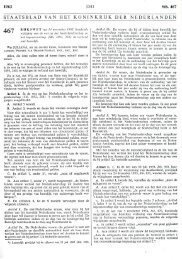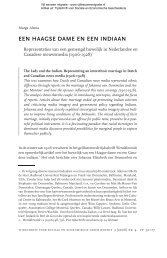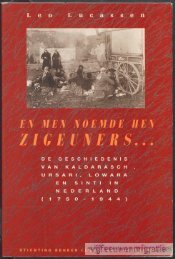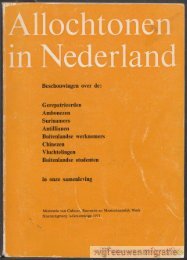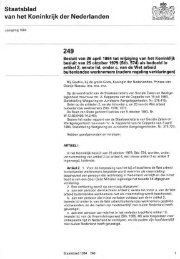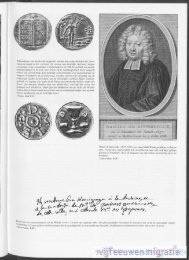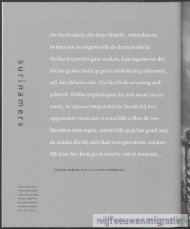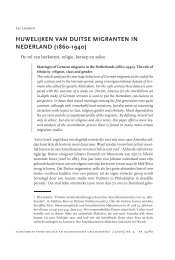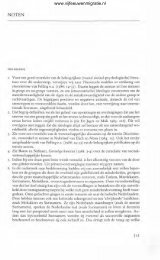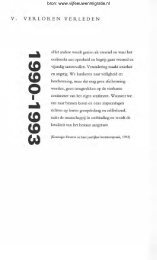Survey of the Archival Sources concerning Migration and Settlement ...
Survey of the Archival Sources concerning Migration and Settlement ...
Survey of the Archival Sources concerning Migration and Settlement ...
You also want an ePaper? Increase the reach of your titles
YUMPU automatically turns print PDFs into web optimized ePapers that Google loves.
INTRODUCTIONI. Dutch immigration history <strong>and</strong> <strong>the</strong> IISHIt is <strong>of</strong>ten stated that <strong>the</strong> virtue <strong>of</strong> tolerance is one <strong>of</strong> <strong>the</strong> fundamental components in <strong>the</strong>history <strong>of</strong> <strong>the</strong> Ne<strong>the</strong>rl<strong>and</strong>s; this isl<strong>and</strong> <strong>of</strong> forbearance in a rough <strong>and</strong> merciless ocean <strong>of</strong>intolerance. Although this image may be somewhat sullied by bringing to light somehistorical facts which prove <strong>the</strong> opposite, it is none<strong>the</strong>less possible to argue with somecogency that Holl<strong>and</strong>, in a comparative perspective, for long periods in its history hasindeed provided a safe haven to <strong>the</strong> persecuted. We may lend credence to this idea byreferring to famed philosphers like René Descartes, John Locke, Thomas Hobbes <strong>and</strong>Pierre Bayle, who all came to <strong>the</strong> seventeenth century Dutch Republic because <strong>the</strong>ywere not free to express <strong>the</strong>ir views in <strong>the</strong>ir native countries. The French freethinkerPierre Bayle considered <strong>the</strong> Dutch Republic in <strong>the</strong> seventeenth century to be "la gr<strong>and</strong>earche des fugitifs", 4 because in his experience <strong>the</strong> nation was comparatively friendly <strong>and</strong>helpful towards refugees from many nations.Besides <strong>the</strong> freedom <strong>of</strong> expression <strong>and</strong> religion which made it a suitable place totake up residence, we also have to take into account <strong>the</strong> thriving economy as animportant part <strong>of</strong> <strong>the</strong> attraction <strong>of</strong> <strong>the</strong> country. This liberal attitude towards foreigners,dissenters <strong>and</strong> soldiers <strong>of</strong> fortune became indissolubly associated with <strong>the</strong> Golden Agein <strong>the</strong> Ne<strong>the</strong>rl<strong>and</strong>s; in <strong>the</strong> centuries which followed, <strong>the</strong> relative tolerance remained <strong>and</strong>one might say that it became a more or less integral part <strong>of</strong> Dutch history.If we span several centuries to take a closer look at <strong>the</strong> Kingdom <strong>of</strong> <strong>the</strong>Ne<strong>the</strong>rl<strong>and</strong>s in <strong>the</strong> 1930's – by <strong>the</strong>n a constitutional monarchy – we can fairly easilyillustrate that <strong>the</strong> principle <strong>of</strong> relative tolerance is still to be observed in this period.David Luschnat for example, who escaped Nazi Germany <strong>and</strong> came to Holl<strong>and</strong>, spoke<strong>of</strong> this "asylum for <strong>the</strong> atrociously persecuted" in his poem "Amsterdam, April 1933" as<strong>the</strong> "good, white <strong>and</strong> clean ship's cabin Holl<strong>and</strong>". 5 Quite apart from <strong>the</strong> fact that this"cabin" soon became less attractive because <strong>of</strong> <strong>the</strong> deteriorating national <strong>and</strong>international situation, our country once more remained comparatively hospitable; manyrefugees from <strong>the</strong> exp<strong>and</strong>ing German "Third Reich" settled here.One <strong>of</strong> <strong>the</strong> more eloquent representatives <strong>of</strong> this spirit <strong>of</strong> tolerance was <strong>the</strong>publishing firm <strong>of</strong> Allert de Lange in Amsterdam. In <strong>the</strong> thirties Gerard de Lange, son<strong>of</strong> Allert de Lange, was a very important publisher <strong>of</strong> German writers in exile, whowere not permitted to publish in <strong>the</strong>ir native country. Authors like Joseph Roth, StefanZweig <strong>and</strong> Bertolt Brecht – to name just a few – had to yield to Nazi pressure <strong>and</strong> founda safe haven in <strong>the</strong> Ne<strong>the</strong>rl<strong>and</strong>s. This renowned publisher leads us to our ownInternational Institute <strong>of</strong> Social History, not only because 6.50 linear metres <strong>of</strong> <strong>the</strong> DeLange archives are held here, but even more since <strong>the</strong> IISH itself has always had aspecial relationship with migrants.


